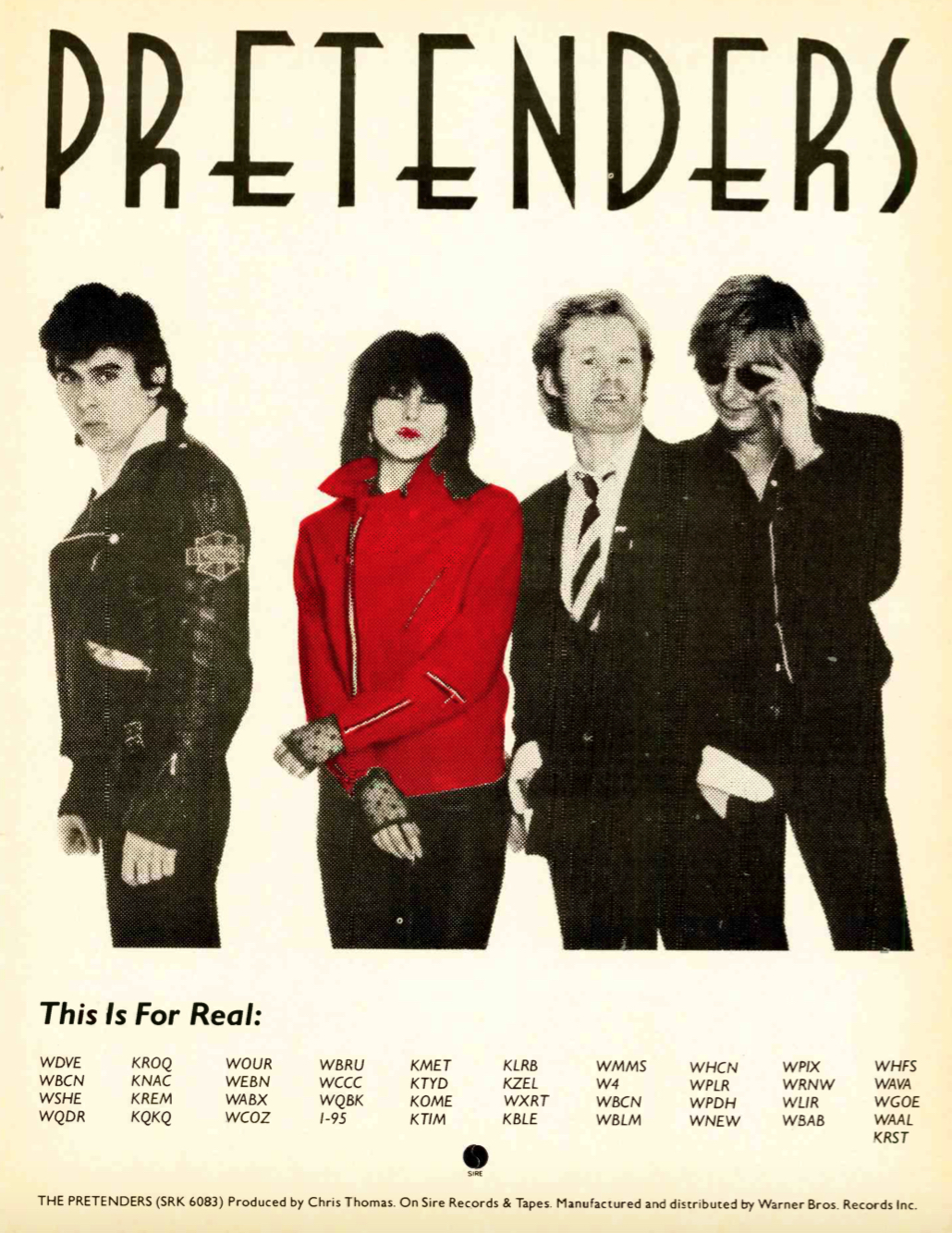 Just moments into the self-titled 1980 full-length debut for The Pretenders, Chrissie Hynde established a commanding presence leading the Anglo-American band she formed two years earlier. “Precious” was a bold opener bristling with punk energy in its squalling rhythm guitars and pummeling drums, crowned with Hynde’s sneering, half-spoken, half-sung vocal looming over the mix as she conjured Cleveland street scenes and sexual trysts with a contrary mix of boasts and self-deprecation.
Just moments into the self-titled 1980 full-length debut for The Pretenders, Chrissie Hynde established a commanding presence leading the Anglo-American band she formed two years earlier. “Precious” was a bold opener bristling with punk energy in its squalling rhythm guitars and pummeling drums, crowned with Hynde’s sneering, half-spoken, half-sung vocal looming over the mix as she conjured Cleveland street scenes and sexual trysts with a contrary mix of boasts and self-deprecation.
Released in the U.S. on January 19, 1980, at the trailing edge of ’70s punk and new wave assaults on mainstream rock, Pretenders traded on its frontwoman’s substantial punk bona fides. An American expat who fled her middle-class upbringing in Akron, Ohio, Hynde had followed her rock ’n’ roll dreams to London in 1973. There she had worked in the King’s Road boutique run by impresario and future Sex Pistols mastermind Malcolm McLaren and designer-cum-punk-muse Vivienne Westwood, stumbled into rock journalism under the wing of mercurial NME editor Nick Kent, and befriended future members of the Sex Pistols, the Clash and the Damned. Self-taught on guitar and harmonica, Hynde also gigged with several short-lived bands. Her adventures in London’s punk demimonde were reinforced by encounters with stateside pathfinders including members of the New York Dolls, their Heartbreakers cousins and Iggy Pop.
Like her friends in the Clash, however, Hynde’s musical instincts were broader and deeper, embracing older rock, funk and R&B influences alongside the ur-punk of the Stooges, Chicago blues and heartland rockers like Mitch Ryder and the James Gang, local favorites during her undergraduate days at Kent State University. The three Hereford, England, musicians she recruited for the Pretenders—guitarist James Honeyman-Scott, bassist Pete Farndon and drummer Martin Chambers—brought substantial chops to the equation and even a certain wariness of punk’s more self-conscious DIY pretensions.
As a result, the first side of the band’s debut set leans into punk-friendly aggression even as it tips us to the sophistication underlying its crunching guitars and flailing drums. The steady-rolling pace of “Precious” is followed by the stop-and-start riffs of “The Phone Call,” the first of several Hynde originals that sidestep even meters with shifting time signatures. That tactic moves into a higher gear on the feverish “Tattooed Love Boys,” a feverish rave-up spiked by Honeyman-Scott’s chiming guitar figures.
Hynde’s staccato vocal races through fragmented erotic images that veer from flirtation to violence, alluding to a real-life encounter with bikers that she would later detail in her 2015 memoir, Reckless: My Life as a Pretender.
“A good time was guaranteed for one and all
The tattoos did target practice in the hall
While waiting for their number to get called out
I, I, I, I found out what the wait was about…”
That song’s careening energy, as well as its edgy conflation of pleasure and pain, is echoed by “The Wait,” offering further evidence of the band’s cohesive power as musicians, captured by producer (and “fifth Pretender” for the band’s first three albums, according to Hynde) Chris Thomas with a canny balance of live performances with spare overdubs and a few post-production effects. Unequal line lengths again push and pull at the song’s structure, with Hynde’s breathless vocal once more creating an illusion of chaos held narrowly at bay.

The album was an immediate favorite on FM radio. This ad originally appeared in the Jan. 26, 1980 issue of Record World
Hynde’s frank eroticism wasn’t new to rock, but her determination to stand eye to eye with male rockers informed both sight and sound in projecting her band’s image. Her early embrace of British Invasion front-runners including the Beatles, the Stones and the Kinks inspired the relative androgyny of her stage image, from a shag haircut worthy of Keith Richards or Jeff Beck to her penchant for leather. Reveling in her kinship with her band, she was still its alpha member and chief architect of its sound. In retrospect, only Joan Jett was marking out similar turf, a parallel intriguing in both timeline and influence given Jett’s 1979 London sojourn and her own ties to Sex Pistols Paul Cook and Steve Jones.
In an era when albums still reigned and track sequencing was a crucial component, Pretenders was front-loaded with rock aggression, yet fans on the band’s British home turf already knew what most American fans would only learn at the end of side one: The quartet’s take-no-prisoners focus as rockers was complemented by equal skill at more melodic pop, made plain on their first single and side one’s closer, a cover of the Kinks’ “Stop Your Sobbing.”
For their first studio session, the band had enlisted Nick Lowe as producer, a shrewd choice given the “Basher’s” skill at showcasing young bands with an economical emphasis on energy over polish. Hynde’s vocal reveals sweetness without softening Ray Davies’ tough love declaration to a distraught lover, then unfurls a series of overdubbed entreaties (“Gotta stop sobbing now, oh…”) over the fade. Scheduling conflicts compelled a change of producer, so we’ll never know how Lowe might have altered the band’s sonic imprint. Instead, Sex Pistols producer Thomas took over the remaining sessions.
Related: The Pretenders’ Rock and Roll Hall of Fame induction
Neither “Stop Your Sobbing” nor the equally melodic second single, “Kid,” were able to break into the British top 20, but a third pop-leaning seven-inch topped the British singles chart and broke the band into the U.S. top 20. “Brass in Pocket” dialed back the band’s attack to focus on Hynde’s sultry, playful vocal in a coyly seductive love song that could double as the singer’s own demand for the spotlight.
Watch the Pretenders perform their breakthrough hit, “Brass in Pocket,” weeks’ earlier at the star-studded Concerts for Kampuchea in London
“I’m special,” Hynde insists, “so special, I gotta have some of your attention, give it to me.” With her band’s accompaniment stripped down to a minimalist pulse tickled by Honeyman-Scott’s spare guitar figures, Hynde proved her point, bridging rock, pop and punk handily. The album’s final track, “Mystery Achievement,” touched on each of those bases: A tough opening bass figure, flashes of bright rhythm guitar, fluid lead guitars and a weave of overdubbed Hynde vocals exploit a shift from minor-keyed verses to major-key choruses for a triumphant closer.
Pretenders would top the British album chart and reap top 10 slots in the U.S., Canada and Australia, establishing Hynde as a major rock songwriter and her band as a potent live unit. The glimpses of rock ’n’ roll excess teased by the lyrics weren’t artifice, however. Offstage, substance abuse and its members’ turbulent private lives would take a lethal toll over the next two years, with Farndon fired as his drug usage spiraled out of control. Two days after he was sacked in June 1982, Honeyman-Scott died of heart failure attributed to cocaine intolerance. Farndon’s struggle with heroin would end with his death a year later, leaving Hynde and Martin Chambers as the surviving Pretenders. That they would rebound with an equally strong new lineup and a third album rivaling their debut for musicianship and songwriting would offer bittersweet proof of just how tough Christine Ellen Hynde is.
Pretenders are touring; tickets are available here and here. Their recordings can be ordered in the U.S. here and the U.K. here.






2 Comments so far
Jump into a conversationIs there a badder-ass lyric in rock than:
“I shot my mouth off and you showed me what that hole was . . . . for”.
Bought the album hot off the press and saw them on first tour in NYC all 4 original members.
This first album still kills it. Energy, musicianship and song craft maybe never equaled before or since.